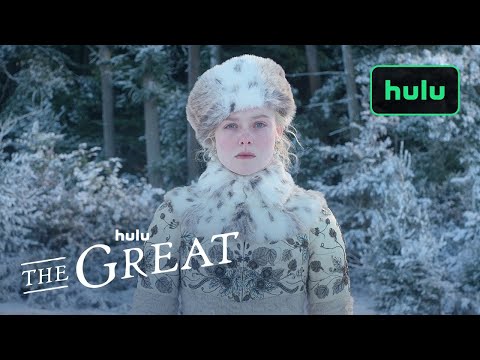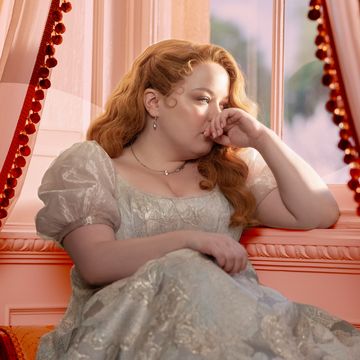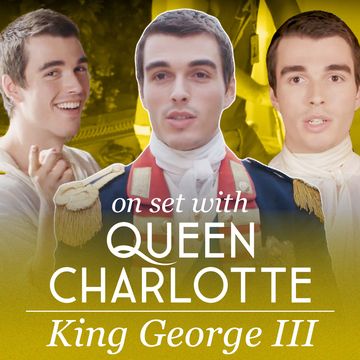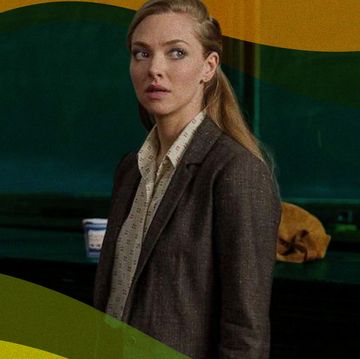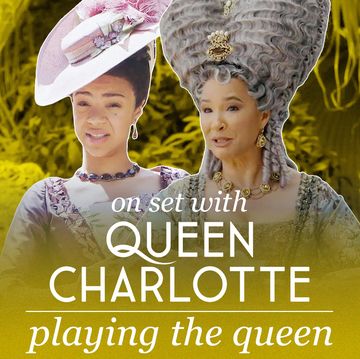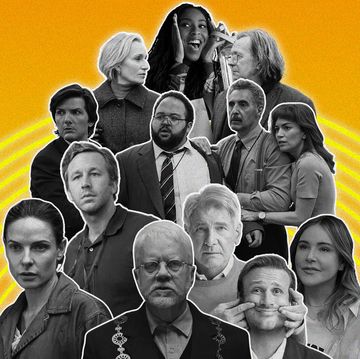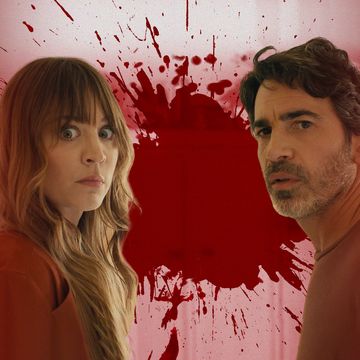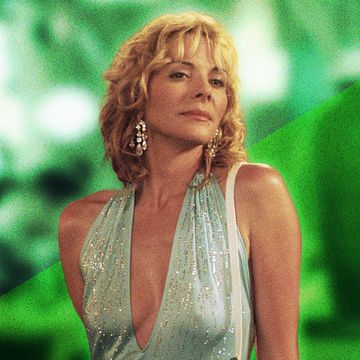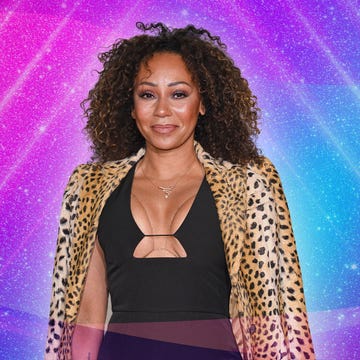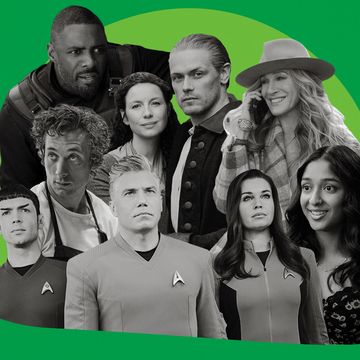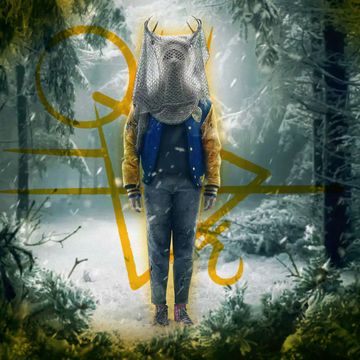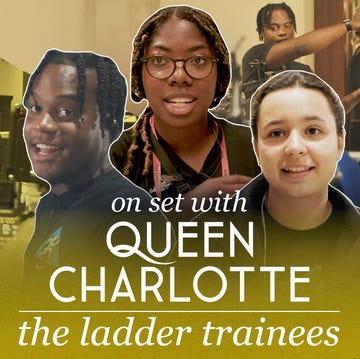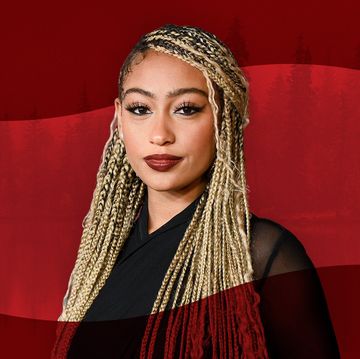Warning: This article contains major spoilers for the third season of The Great.
Nicholas Hoult knows you’re probably reeling from the loss of Peter III on The Great, the ahistorical Hulu dramedy series that reimagines the reign of Catherine the Great (played by an effervescent Elle Fanning). In some ways, the English actor — who is best known for his big-screen work in the X-Men franchise, Mad Max: Fury Road, The Favourite, and The Menu — is still grieving the sudden demise of his star-crossed Russian emperor, who drowns in an icy lake in the sixth episode after telling Catherine that as the new leader of the military, he was going to help reclaim Swedish territory to ensure that he would not be forgotten to history.
“The scene between Catherine and Peter just before his passing is one of my most favorite scenes I’ve ever gotten to do because the writing is incredible, and Elle and I were both in a very emotional state,” Hoult tells Shondaland from his hotel room in Prague, where he is shooting Robert Eggers’ new remake of Nosferatu. “I was particularly in an emotional state that day [because] it was my last day playing that character. Even in the rehearsals of that scene, I started crying, and it was uncontrollable, and I was like, ‘Oh, no, I’m not meant to be crying.’ It was like saying goodbye to something that meant a lot to me.”
Below, Hoult breaks down the evolution of Peter and Catherine’s relationship, how he feels about Peter’s ending, and what he will miss most about working with the cast and crew of The Great, especially Fanning.
MAX GAO: Considering that the real Peter III died shortly after Catherine took over as empress of Russia, how did you react to creator/showrunner Tony McNamara’s decision to kill off Peter midway through this season, and were there any conversations about keeping him alive longer?
NICHOLAS HOULT: It was emotional for me. It’s a character that I’ve really enjoyed playing and had a lot of fun with, and it’s the longest I’ve ever played a character, so I’ve spent a lot of time pretending to be him. And obviously, I’ve grown up a lot in life generally through those years [and became a father myself], so it very much felt like the end of a chapter and putting something to bed. But Tony wrote a fantastic scene beforehand with Elle and myself where we really get to wrap up a lot of the open things about those two characters’ relationship, and it was just a joy to play that scene. It takes expectations and flips them, and you’re not quite sure where things are gonna go, and then Peter’s sudden demise at that moment is a beautiful thing, so it felt like the right way to say goodbye to the character.
MG: What were the logistics of shooting Peter’s death scene? I have to imagine that you weren’t actually standing on thin ice, right?
NH: Well, no, we were just in a field [laughs]. This is the mad thing and the wonderful thing about our production designer and the VFX team — it wasn’t even snowy where we were. It was maybe September-October time in England, so there was a bank that made it look like full snow and then a couple of sheets of fake-looking ice. But otherwise, it was all blue screen and green screen and all added afterwards. So, there was no riding horses on the ice lakes, there was no snow, it was all fake.
MG: Were you ever in a water tank to get the final shot where Peter is dead?
NH: Oh, yes. I was! Sorry, I was in a water tank [laughs]. We went to Pinewood [Studios] to do the shot of me floating away, which was actually interesting because all that costume does get quite heavy, and you have to go under quite deep into this tank of water, and there’s professionally trained divers with you, and you can hear one of them speaking through an underwater speaker. But [before] the shot, you have your air tank and goggles or whatever, and you take your goggles off, take your last breath, and hand your air tank away, and then it’s just you floating in this quite deep, large tank of water holding your breath as long as you can, which is quite scary. With the costume, when the water is heavy enough — if they’d left me there, I would’ve [makes a cutthroat motion to indicate he too would have drifted away].
MG: In the first half of the season, Catherine and Peter are learning how to co-parent and move past the events of the season two finale, and they seem to arrive at this place where they know they’re bound to hurt each other in some way, but they still choose to love each other anyway. How would you say Catherine and Peter have fundamentally changed each other’s understandings of love?
NH: They met when Peter was very selfish and self-absorbed and didn’t care or look after Catherine whatsoever, and she was very naive. And through the previous two seasons, they’ve both matured. She’s taken power in Russia and seen so much in life in that brief time, and Peter has learned somewhat to care for others and what that means, and how these decisions [that he makes] affect himself and others. So, there’s been a maturity to both of them, which is what’s exciting about where we leave their characters because they both have changed each other and grown together, and the love has evolved from being one-sided or selfish from both sides to being this kind of understanding nature of accepting each other’s faults and loving each other despite that.
MG: Peter’s fatal flaw was that he didn’t think he could live up to his father, and he wanted to create his own legacy that did not merely dwarf in comparison to that of Catherine. What did you want to convey in the quieter moments to show Peter’s humanity and vulnerability, especially since the show is so dialogue heavy?
NH: Oh, that’s a good question. This is the first interview I’m doing about season three, so you’re throwing some tough questions at me, and it’s good because it’s making me think about all these things [laughs].
The key thing is, obviously, Peter has a lot of self-doubt, and through becoming a father, he’s examining how he was parented, but also what he’s gonna leave behind, what his legacy is. I think that’s what propels him to make the decisions that he does in this season. He loves being a father, he loves not ruling Russia, he loves not having the pressure of that. But then it becomes a thing whereby he starts to get these niggling ideas about how people will remember him and how Paul, his son, will remember him, and that really plays havoc with his mind because he was in a content place, and suddenly this — I want to say doubt again, but it’s more than that. It’s this effect of not feeling good enough for years through his parents that is coming to fruition, and he really wants to live up to that and be remembered in a spectacular way.
MG: What are you going to miss most about playing opposite Elle Fanning and being able to craft this on-screen relationship in the way that you have together?
NH: The fun of it, the spontaneity of it, how sharp the dialogue is, and the playfulness of it. Elle’s an incredible scene partner because she’s got her intuition and her ability to be alive within each moment and give a lot as a performer, but also be very perceptive and adjust things and just completely be alive in the moment. It’s incredible to be in those moments [with her], so I’ll miss that. And just trying to make each other laugh and seeing the effect of different portrayals of those characters in those scenes and how it can just completely flip each moment.
MG: How do you think the loss of Peter will shape Catherine as a leader going forward? What does she learn from Peter that will stay with her long after he is gone?
NH: I think that’s something that certainly has been infiltrating throughout the seasons, whereby she has been referring to him somewhat at times. Although she disagrees with a lot of statements he makes about being a leader, there are times when what he says does come to be true, so I think that’s something moving forward that she would take from their correspondence.
First of all, the thing that I loved about the episode when Peter does die is how Tony, in his writing, then approaches grief and denial and the loss of someone that’s loved, and then also how Elle captures that and brings it to life because it’s so unexpected, and the show takes a real turn in a wonderful way. So, from an outsider’s point of view, suddenly I was like, “Oh, this is really fun.” Because although Peter is now gone, there’s this whole new box of toys opened up for all these characters to grow and evolve because of that. So, that’s something that I, as a fan of the writing and all these characters in the show, get to enjoy now and see where it goes.
MG: To your point, the second half of the third season is a fascinating exploration of grief — Peter was hated by a lot of people, but Catherine wasn’t the only one who loved him. There are also his best friend, Grigor (Gwilym Lee), and his aunt, Elizabeth (Belinda Bromilow). How would you describe the evolution of Peter’s relationships with them and where he leaves those different dynamics?
NH: With Grigor, it’s so fascinating because obviously, when the show started off, Peter treated Grigor pretty horrendously. He was openly having intercourse with his wife, Georgina [Charity Wakefield], in front of him frequently [laughs], and he caused a lot of pain to Grigor. But they’ve also been best friends since childhood, and there’s that bond between them that will never be broken. So, it’s interesting to see how that then gets unpacked because Grigor probably shouldn’t have been Peter’s friend for quite a long time, but he stuck by his side and really cares for him. And in [Peter’s] absence, [Grigor] kind of becomes a father figure to Paul and really steps up to the plate and takes on a lot of responsibility, and I think those were really beautiful scenes for Gwilym to play and [for us] to watch.
Elizabeth has been a fascinating character throughout because she loves Peter a lot and cares for him but is playing the court [and] is supportive of Catherine at times. So, I think one of the most fun things about the show is you’re never quite sure where allegiances stand and who’s working for themselves. And I think Elizabeth kind of says farewell to Peter before the moment of his death in some ways, but then the death does profoundly hurt her as well. There’s a lot going on!
MG: After Peter dies, it’s not like you left the show right away, because you still had an opportunity to play Pugachev, Peter’s doppelganger, who pretends to be Peter in disguise to start an uprising against Catherine. How did you want to approach playing him in a way where we, as the audience, can see the clear difference between him and Peter?
NH: Yeah, that was something that Tony and I spoke about a lot because obviously, Pugachev has a resemblance to Peter, but then how [do we] distinguish him from him? But then, at times for the plot, he has to be able to do a good enough impression of Peter that is believable, that people could potentially think he was Peter. So, that’s a real tricky balance to try and navigate, and hopefully, I pulled it off [laughs]. But it was fun because Pugachev is this kind of rogue who’s landed on his feet in the court and is taking full advantage of it, and he is a little bit sloppy and messy, and he hates a lot of the things that Peter was, so it’s always done with a slight mockery and a slight disdain when he’s pretending to be Peter.
MG: Looking back, do you have a favorite “Peterism” — a favorite character trait, line of dialogue — that has stuck with you from the two-and-a-half seasons that you were able to play him?
NH: Ooh, I think one of my favorite things about Peter is his love of food, and I think one of the most brilliant things that Tony did is his wrap gift to Elle and I, [which] was a book he made of all the food throughout the seasons — a recipe book essentially. So, we have a little bound book of all the recipes and food we’ve talked about throughout the seasons, which is very special because one of the things that I’ve loved about Peter the most is his bizarre palette.
MG: You’re currently shooting the new Nosferatu, and you just signed on to reunite with Toni Collette and work with one of your childhood heroes, Clint Eastwood, in Juror #2. What can you tell me about your upcoming projects, and what kinds of stories or genres are you looking to tackle going forward?
NH: Nosferatu, we’re shooting at the moment. … I just love Robert Eggers’ movies so much, so it’s exciting to get a glimpse behind the scenes and see how he and his team craft those films and the ideas and thought process behind it. So, I’m really enjoying making this. Next, I’m going to work with [director] Justin Kurzel and Jude Law on a film called The Order, which is about an FBI agent in the ’80s who brought down a white supremacist group who were planning on attacking the government. And then I’m going to do Juror #2 with Clint Eastwood, which is so cool. And I get to reunite with Toni Collette, who played my mum in [the 2002 film] About a Boy, so lots of wonderful things are coming up that I’m very excited about. After that, I’ll probably take a little pause and sleep and probably just be a dad for a little while and recharge. So, I’m not like, “Oh, I need to do this movie; I need to do this movie.” I’m just hoping to work with good people because that’s ultimately what it’s about.
MG: Have you already talked to Elle about working together again?
NH: Yeah, yeah, we’ve spoken about it, and we’ve gone back and forth about it. I’d love to work with Elle again, so we’re on the hunt for stuff. We’ll find something good soon, hopefully, because I love being in scenes with her and being around her, so let’s hope something good comes along soon …
MG: Before I let you go, do you have any final parting words for people who will be distraught over Peter’s death?
NH: [Laughs] I don’t, no. You can always watch the season again. You can always just watch it again from the beginning! As I said, I’m just really going to miss playing him.
This interview has been edited and condensed for length and clarity.
The first three seasons of The Great are now streaming on Hulu.
Max Gao is a freelance entertainment and sports journalist based in Toronto. He has written for The New York Times, Los Angeles Times, NBC News, Sports Illustrated, The Daily Beast, Harper’s Bazaar, ELLE, Men's Health, Teen Vogue and W Magazine. Find him on Twitter @MaxJGao.
Get Shondaland directly in your inbox: SUBSCRIBE TODAY

